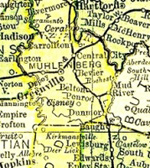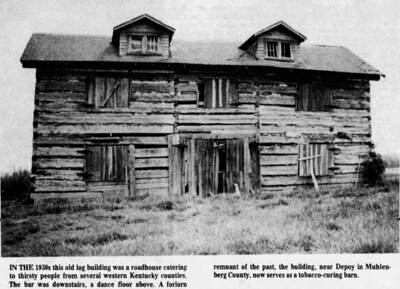Muhlenberg County Kentucky

Local History: L
Dry Muhlenberg County 's Got a Hangover

Greenville, Ky. - Muhlenberg County has a hangover because it's legally dry. From Moorman to Dunmor, Paradise to Depoy, there's no such thing as legal over-the-county liquor or beer.
Like most hangovers, it's both funny and painful. Painful because alcohol and the behavior it induces sometimes result in tragedy. Funny because a restricted vice seems to be better than no vice at all and the yen for drink produces comic situations.
To say that Muhlenberg County is legally dry is correct, but it doesn't come close to the truth of the matter. Chances are that anyone in search of a drink in Muhlenberg County or any other dry county in Kentucky can find a bootlegger nearby.
In fact, the bootlegger's probably within walking distance. Kentucky State Police and the sheriff's office estimate there are between 47 and 49 active purveyors of illegal spirits inside the county.
The chances are also good that at any given time two or three bootleggers will be in jail in Greenville, the county seat. Authorities say thaty have made between 20 and 30 raids this year, confiscating in the process between 2,300 and 2,400 cases of liquor and beer.
In two separate raids last Tuesday state police and a sheriff's deputy hauled away an inventory large enough for a legal liquor store.
They got 78.5 cases of beer, 192 bottles of ale, 30 fifths of wine, 54 half-pints of whisky, 44 half-pints of gin and 3 half-pints of vodka.
Bootleggers say they sell beer for $10 a case or $2.50 a six-pack. Half-pints or whisky, vodka and gin sell for $2.50. One 12-ounce can of beer brings 45 cents.
So, everytime a bootlegger is raided he looses a hefty profit. If it's the third arrest, he can be sent to the penitentiary at Eddyville. However, the heaviest sentence meted out this year in circuit court, for a third offense, has been a $500 fine.
First and second bootlegging offenses (the charge is worded “possession of alcoholic beverages for sale in local option territory”) are tried in county court.
Although the toll in confiscations, fines and court costs is heavy, it apparently isn't a deterrent to inveterate bootleggers.
One Central City man told police that the four times he was raided in 14 days recently cost him $5,000. Police took 91 cases of beer from him in the raids but don't think they've put him out of business by any means.
Another bootlegger, who says he has been arrested eight times in Muhlenberg County for illegal selling, isn't scared of jail but does have his preferences.
“If I have to go to the pen, I'd rather go to federal,” he says. Among those who have sampled both, federal prisons are considered more desirable.
In some other ways there's a devil-may-care attitude about bootlegging in the county. Police and bootleggers are on a first-name basis, having been through the arrest-bail-fine routine several times before.
Last Tuesday, when the state police cars had been rolled up to the courthouse door for unloading. Dewey Griffin got out, unhandcuffed, lit a cigarette and watched as case after case of beer was hauled into the sheriff'soffice.
A bystander said to him in passing, “Dewey, why do you do like you do do do?” The phrase is from a Bluegrass tune of the same name.
Others who happened to be nearby also knew Griffin on a first-name basis. No one seemed surprised to see him standing there in the April sun, blinking in the unaccustomed light.
When they are raided, bootleggers take it in stride. One has serenaded officers with his guitar. Another doesn't like to turn down the volume of his radio, always tuned to a country music station.
If it weren't a problem in other, more serious ways, Muhlenberg County would have a problem storing all that illegal booze.
Right now the sheriff's office is nearly full (beer in the front office, hard liquor in back). So is a basement room of the courthouse.
And it's going to keep piling up. State police and Sheriff W. H. Cornelius are “cracking down” on the practice because they believe bootlegging is the root cause of many violent deaths in the county.
State Trooper J. E. DeArmond says, “A lot of our fatal accidents are directly related to bootlegging.”
State Police Detective Vernon Albro says he can think of six murders in the past two years related to bootlegging. He also says that bootlegging is a more serious problem than drugs in the county.
Authorities have stepped up their raids because “people are against it.” When the Muhlenberg grand jury convenes in May, police expect church and civic groups to demand harsher punishment for repeated offenders.
Muhlenberg County hasn't always been dry. After Prohibition ended, the county was a regional attraction because of its roadhouses.
They had exotic names that even today conjure up memories of a different time. There were the Bittersweet Tavern, Little Chicago and the Rainbow Garden. People went to them to chase away the blues of the Depression or simply to have a good time.
Most had a dance floor and a band to attract big crowds. Like bootlegging, the created problems.
“Every weekend we'd have a shooting or someone would get killed,” one woman remembers.
Apparently, Muhlenberg countians didn't like the roadhouses any better than bootleggers. After a roaring decade, a local option election was held. The sale of liquor became illegal in April 1942.
It hasn't been the same place.
Source: Abrams, Garry. “Dry Muhlenberg County's got a hangover.” The Messenger & Inquirer [Owensbor, KY], 21 Apr 1974, p. D1.
Updated July 14, 2022